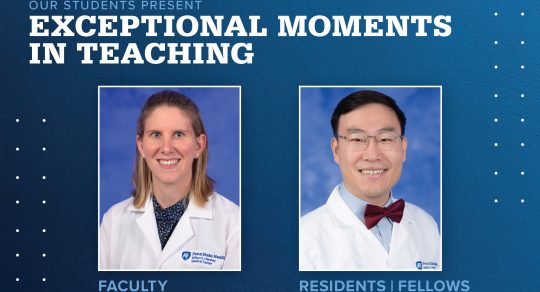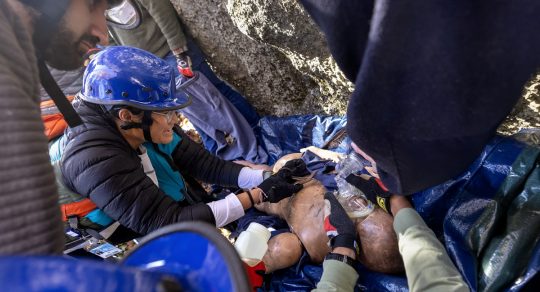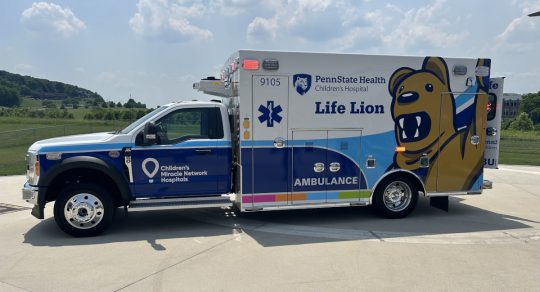Fellowship
Emergency Medicine Medical Education
The Emergency Medicine Medical Education Fellowship at Penn State Health Milton S. Hershey Medical Center is a 12-month or 24-month (if Master of Education is desired) non-ACGME-accredited program that accepts one fellow per year. The program will be individually funded with use of 75% Penn State tuition discount.
Explore More
Most physicians do not receive training in medical education yet are required to teach and train medical students, residents, nursing, and or staff depending on institutional structure. The goal of this program is to teach emergency medicine physicians the knowledge and skills of becoming a medical educator so they are prepared to meet and excel at this requirement. The program focuses on 5 main pillars: clinical care, teaching, education, research and administration.

Program Overview
Penn State Health is well known for its ability nourish the curiosity and career goals of academic faculty. Emergency medicine medical education fellows will be submerged in a supportive environment of theoretical and experiential learning. Theoretical learning will occur through classes through the Penn State World Campus along with journal clubs and various faculty development courses. Experiential learning will occur through teaching shifts, didactic design, administrative projects, and various other hands-on experiences. Given the small size of the program, each fellow will receive close mentoring from some of the country’s leading experts on medical education. Each fellow will also have the opportunity to tailor some of his/her education to meet postgraduate goals and interests.
Learn More about the Fellowship
Curricular topics will include but are not limited to: educational theory, simulation, feedback, bedside teaching, procedural teaching, curriculum design, digital scholarship, academic promotion, advising/mentorship, evaluation processes, faculty development, recruitment and formal letter writing.
Program objectives are as follows.
Clinical care objectives
Attend in the emergency department and supervise medical students, residents, and advanced practice providers.
Uphold institutional R.I.T.E. values
Meet documentation standards
Work 8 shifts per month
Participate in monthly multidisciplinary case review conference
Teaching objectives
Prepare and facilitate at minimum of 8 hours of conference didactics per academic year
Provide bedside teaching to resident learners.
Facilitate emergency medicine rotating medical student simulation didactics.
Participate in Penn State University College of Medicine medical student teaching opportunities.
Education objectives
Attend American College of Emergency Physicians Teaching Fellowship
Attend either yearly Society of Academic Emergency Medicine Conference or Council of Residency Director’s scientific assembly.
Obtain medical education certificate if participating in 1 year fellowship
Obtain Master in Education if participating in 2 year fellowship.
Attend 1 Woodward Center faculty development session per month.
Research objectives
Submit 1 manuscript per academic year for publication in an academic/education journal.
Attend monthly medical education journal clubs
Serve as a reviewer for an educational journal.
In addition to the above items, 2 year fellows will complete a capstone project for the master program.
Administrative objectives
Work with the Associate Program Director in the development, design, implementation and management of conference didactics.
Serve on the Clinical Competency Committee
Serve on the Program Evaluation Committee
Conduct medical student candidate interviews.
Conduct residency candidate interviews as designated by the emergency medicine residency program director.
Work with Clerkship Director in the development, design and implementation of medical student didactics.
Applications will be accepted on a rolling basis starting July 1 until March 1 of the same academic year.
Medical education fellowship candidates must meet the following criteria to meet eligibility:
Graduation from a US ACGME accredited emergency medicine residency
Be either board certified or board eligible by ABEM/AOBEM
Possess a DEA license by fellowship start date
Possess an unrestricted medical license to practice in Pennsylvania by fellowship start date
Applications should be submitted in the form of one PDF document with the following:
A cover letter
A personal statement
A curriculum vitae
Program director email and telephone number
Two additional references
Completed applications can be emailed to the fellowship director, Dr. Lawrence Kass, at lkass@pennstatehealth.psu.edu.
Leadership

Professor and Vice Chair for Academic Affairs, Emergency Medicine
Program Coordinator, Emergency Medicine Medical Education Fellowship, Emergency Medicine



